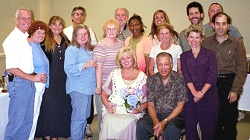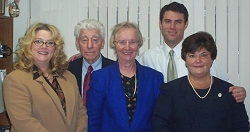|
Thank you for visiting the South Shore Hypnosis Center's website.
 I would like to invite you to use the services we provide. I am confident you will have a positive and rewarding experience, as have literally hundreds of clients since the South Shore Hypnosis Center opened in December 1989.
I would like to invite you to use the services we provide. I am confident you will have a positive and rewarding experience, as have literally hundreds of clients since the South Shore Hypnosis Center opened in December 1989.
At the bottom of this page, I have given you a short history of hypnosis over eons of time.
This therapy can be used successfully for a wide range of objectives, including the following at the South Shore Hypnosis Center:
| Smoking Cessation
Weight Loss
Stress Reduction
Pain management
Insomnia
Memory
Habit Control
Public Speaking
|
 |
Study and Concentration
- Help with the bar exam
- Help with the police exam
- State police training and preparation
- Learning a foreign language
Sports Performance
- Improve your golf game
- Weight lifting
- Tournaments
Anxieties
- Fear of flying
- Interviews
- Competition
|
And, for many, many other things. In essence, with whatever areas you want help in improving, changing or motivating, hypnosis can give you that edge for success.
We also do past life regressions. Please call for a special appointment time.

Hypnotic or suggestive therapy has been used as a healing technique since the beginning of history. References to it can be found in the Bible. It was of prime importance in the "sleep temples" of Ancient Greece, which were places of pilgrimage and healing.
In the Middle Ages belief in miraculous cures associated with religious shrines was widespread. Healing was brought about by touch and prayer.
During the 18th century the theory of "Magnetism" was developed. Franz Anton Mesmer argued that the planets influenced mankind through their magnetic effects on the "fluid" which occupied all space. He discovered that he could induce people into a trance-like state and concluded that he himself must be a kind of magnet, hence the term "Animal Magnetism". This idea was soon discredited by a French Royal Commission, which found that the magnetic fluids did not exist. James Braid re-examined Mesmerism in the 19th century and reached similar conclusions. It was he who coined the term "hypnosis" for the induction of a trance-like state through simple suggestion.

In the early part of the 20th century hypnosis was used almost exclusively by stage hypnotists, thereby projecting a hopelessly distorted view of the very powerful therapeutic tool. However, in 1955 the British Medical Association endorsed the practice of hypnosis in medical school education, and in 1958 it was recognised by the American Medical Association as a healing modality. Since then hypnotism has become a valuable addition to conventional medical treatment
|